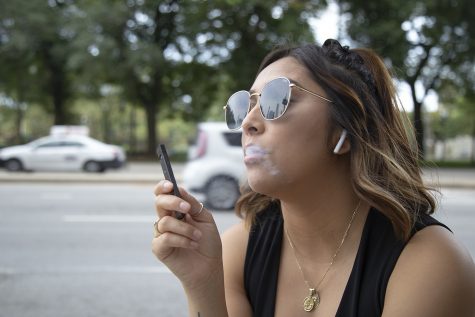Vape flavor ban intends to reduce youth vaping
September 16, 2019

Fabiola Hernandez, junior fashion business major, smoking a JUUL outside Columbia’s Library, 624 S. Michigan Ave., Sept. 10.
Walking through a cloud of fruity-scented smoke may become an experience of the past, as President Donald Trump announced Sept. 11 that the Food and Drug Administration is moving to ban flavored
e-cigarette products.
There have been hundreds of hospitalizations linked to vaping across the country, including one death in Illinois. The U.S. Department of Health and Human Services announced the FDA intends to finalize a policy that would clear the market of non-tobacco flavored e-cigarette products, according to a Sept. 11 statement from the DHHS.
“Vaping targets kids, and these flavors—mint, menthol, gummy bear, Unicorn Milk, lung candy—have been essential to the industry luring children into this new addiction,” said Sen. Dick Durbin (D-Ill.) in a Sept. 11 press release. “Finally, the FDA is doing its job.”
But Gregory Conley, president of the American Vaping Association, said flavored vapes are not to blame for the outbreak of illnesses.
“We know nothing about the Illinois case,” Conley said. “With multiple state health departments … specifically warning about THC vaping products, we don’t believe there is any serious evidence linking nicotine vaping products to these lung illnesses.”
In an Aug. 30 statement to Illinois residents, Illinois Attorney General Kwame Raoul urged residents to avoid all vape use, especially children, young adults, pregnant women and adults who do not currently smoke.
“Symptoms experienced by individuals who have become ill range from difficulty breathing, coughing and fatigue, vomiting and diarrhea,” according to the statement. “People who have been hospitalized reported that their symptoms worsened in the days or weeks after using e-cigarettes or vape products.”
According to the Illinois Department of Health website, there are 52 cases of vape-related illnesses in Illinois. There are also 12 cases under further investigation. The median age of individuals who have become ill from vaping is 22 years old, as of press time.
Senior cinema art and science major Chris Hollenbeck started smoking cigarettes when he was 13, but in the past year he has switched from cigarettes to major vape brand JUUL.
Initially, Hollenbeck used mango-flavored pods until he realized how quickly he was using them. After that, he switched to the menthol flavor.
“My brother was smoking [JUUL] as a minor,” Hollenbeck said. “He was the one who kept pushing me to switch onto JUUL.”
There have been severe increases in underage vaping, as reported May 9 by The Chronicle. From 2017 to 2018, there was a 78% increase in usage among high school students and a 48% increase among middle school students, according to results from the FDA’s annual national survey. In an attempt to limit its appeal to kids, JUUL pulled its non-menthol and non-tobacco pods from stores in November 2018.
Like Hollenbeck, junior filmmaking major Chris Osburn started using nicotine with a traditional cigarette before switching to vaping.
Osburn has avoided JUUL products because he said the pods are expensive and “a little bit too much with the grain.” Instead, he is currently smoking a vape mod.
A vape mod is a mechanical vape, larger than vape pens, that is capable of producing more vapor and, therefore, greater flavor.
Osburn said he enjoys the variety of flavored vape oils available to him. He once tried a flavor called “Psycho Yeti” by Puff Labs, which is supposed to taste like a fruit smoothie.
Despite JUUL suspending the distribution of flavored pods, flavors such as creme, cucumber, fruit and mango can still be purchased on the JUUL website, which can be purchased by an underaged person, as long as they have access to the last four digits of an individual’s social security number who is older than 21. However, this would likely change if a federal ban were imposed.
Conley said JUUL made a grave mistake by limiting access to flavored vape products because most adult users who are trying to quit smoking cigarettes prefer the fruit flavor.
Vaping is “far less hazardous than inhaling 4,000 chemicals, including carbon monoxide [in cigarettes],” said Conley.
If the federal ban is carried out, Osburn said he would probably continue to smoke whatever oil was still available.
“This [ban] is going to send thousands of adults back to cigarette smoking,” Conley said.
The FDA plans to share more on the specific details of the plan and its implementation soon.
UPDATED: Sept. 24, 2 p.m.
Ald. Raymond Lopez (15th Ward) introduced an ordinance to City Council Wednesday that would ban all e-cigarette and vaping products from being sold in Chicago, punishable with a fine up to $5,000.
Lopez announced this ban after the Trump administration pushed for a federal ban on flavored vape products. Lopez said the city should not rely on, or wait for, a federal ban on flavors.
“Chicago can be a leader,” Lopez said. “Companies are marketing their products toward our children with flavors such as cotton candy and bubblegum.”
Lopez said vaping products should not be marketed to help users quit because the products are designed for permanent use.
“We are seeing an encouragement of continued smoking, expanded smoking, all under the guise [that vaping products] are healthier than a traditional cigarette,” Lopez said. “They are both dangerous, they are both filled with chemicals.”







